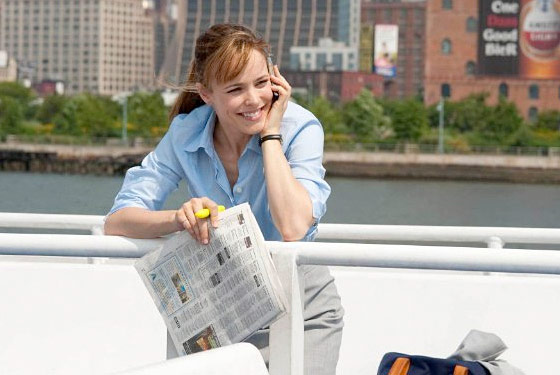
Anne Hathaway was evidently unavailable to play the peppy but insecure heroine in Morning Glory, the latest cookie-cutter chick comedy by The Devil Wears Prada screenwriter Aline Brosh McKenna — so the studio cast Rachel McAdams, who’s like Hathaway with moles. McAdams is every bit as endearing, though, and pulls fewer faces. Chasing after TV divas with outsize egos, she can look like a klutz without looking like a moron, as if only an unconflicted opportunist could handle so absurd a job with aplomb, as if her clumsiness were a sign of integrity.
She plays Becky Fuller, the new producer of the lowest-rated network morning show, Daybreak. (The network is called IBS, but the studio is supposedly in the same building in which CBS’s The Early Show shoots, next to F.A.O. Schwartz and the Apple Store.) Instead of serving a wicked queen, as in Prada, our heroine must soothe and inspire a fallen king, whom she needs to save her show and career. Mike Pomeroy (Harrison Ford) is the Dan Rather–like eminence grise whom the network has fired but who still has time left on his contract. That’s the high concept: What if Rather — with his outsize ego and serious-newsman pretensions — were forced to co-host (with Diane Keaton’s Colleen Peck) a chirpy 7 to 9 a.m. show featuring lifestyle celebs and cooking demonstrations? Wouldn’t you hate to be his producer?
It’s a fine premise, and Ford taps into his apparently bottomless well of bile to take Pomeroy out of the lovable curmudgeon category and make him truly unpleasant. He’s clenched, tight-faced, his voice so gruff that it’s a wonder he has the moisture to keep his vocal cords lubricated; his inner world is cacti and barbed wire. Ford is very funny, but it’s a one-joke character. He needs another sparring partner.
There happens to be one handy: Diane Keaton, maybe the most gifted comic actress of her generation, is smartly dressed and coiffed and ready to fly. But the movie barely uses her. Keaton looms large on the posters and is all over the promos, but this is one step away from being a bit part — her scenes end before they get going. All fake cheerfulness on-camera, Colleen breaks character and complains when the show goes to a commercial — but then, with little transition, she’s suddenly pitching in and clowning around. In montages. Then it’s back to McAdams doing her Mary Tyler Moore–by-way-of-the–Disney Channel shtick and Ford staring daggers at her.
Brit director Roger Michell is better known for movies of high seriousness with writers like Hanif Kureshi (The Buddha of Suburbia) and Ian McEwan (Enduring Love), and it wouldn’t surprise me if he over-identified with Mike Pomeroy. His work is brisk and businesslike, less obvious than David Frankel’s in Prada but nowhere near as warm and affectionate. Neither he nor Aileen Brosh McKenna thinks enough of the audience to develop or even sustain their ideas. At one point it looks as if the answer to the show’s rating woes is to exploit Pomeroy’s disdain for the morning-show genre, to make ratings hay out of his prickliness. But then the idea is dropped — it goes nowhere. It turns out that Pomeroy’s idea of hard news — the linchpin of his argument that there is a place for reporting and analysis even on Daybreak — is confronting the governor of the state at home when he’s about to be arrested in a hooker-and-corruption scandal. That’s some idea of seriousness: Dan Rather turns out to be Geraldo Rivera.
Morning Glory is full of gaps and off notes, from major (Becky’s elided relationship with Patrick Wilson’s hard-news rich-boy dreamboat) to minor but niggling (the live feed from an amusement park that’s fully operational at 8 a.m.). When NBC wants to interview Becky — now a star for turning around Daybreak — for a job at the Today show, they call her IBS boss (Jeff Goldblum, who gives, believe it or not, the least dithery performance). Then the NBC bigwigs meet with her at 8:20 a.m. while her own show is on the air — in front of a TV monitor, so she can be distracted by her dysfunctional-but-lovable surrogate family.
Morning Glory isn’t terrible. It has a lot of craft, a lot of star power, and a fair number of laughs. What irks me is that the filmmakers settle for so little. They poke fun at Daybreak, at the whole artificial, shallow, self-satisfied genre of TV morning shows, yet they approach their own genre — the comic chick flick — with no more inspiration than the people who make those shows. They follow the formula, no matter how insipid and predictable, because they know their core audience won’t have anything else to do and it’s better if they’re only half awake.


